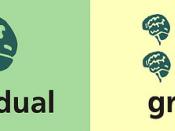T-Group Definition: "The task of a T-group is to study its own process." In its most stripped down form a T-Group, or training group, is nothing more than an accelerated version of any cluster of relationships in any sector of life. More specifically defined, it is a mock approach in learning how to deal with groups, what roles are taken, and what processes it goes through to become cohesive. The working definition and purpose of a T-group, given in Italics above, does hold true to its primary intention, but seems incomplete.
From personal experience participating in a T-group, the study of its development while serving as the foremost function, is clearly affected and sometimes overwhelmed by achieving some type of group goal. A natural tendency of someone put into any group situation is to accomplish something. Whether your group is simply friends trying to complete the task of having fun, or a band trying to achieve uniformity of sound, there is a common ambition.
This universal objective, its place in group work and study, and its importance in development, provides an excellent topic for consideration and discussion.
Taking this idea one step at a time you first need to answer the most obvious question. What is this universal goal? The simplest answer is this. Like the physical entity of a group is made up of individual bodies, the "universal goal" of a group is made up of individual goals. So essentially, the "universal goal" of a group is to achieve its member's individual goals. When broken down this statement itself brings more continuity and togetherness to a group than looking at the same situation in the opposite way. Saying the goal of the individual is to help achieve the goal of a group divides the group more than saying the individual comes first. Allport (1924), an early social psychologist argued the following about groups and individuals: Alike in crowd excitements, collective uniformities and organized groups, the only psychological elements discoverable are in the behavior and consciousness of the specific persons involved .All theories which partake of the group fallacy have the unfortunate consequence of diverting attention from the true locus of cause and effect, namely the behavioral mechanism of the individual⦠If we take care of the individuals, psychologically speaking, the groups will be found to take care of themselves.
This statement reinforces the idea of individual goals having a profound effect on the efficiency of the group. Having a collective aspiration to help everyone complete their goals is the primary function of a group. Whether or not the individual goals are given to each group member, or decided upon independently, the situation is the same. Meaning that different groups are assembled for different tasks. Our group was assembled to be a training group with the main point being to study our own development. Our individual goals were not assigned to us. We chose them. In other situations, a group leader or outside party may assign a different task to each of the group members to reach one specific goal. In either case though, the group is together so everyone can collectively help each other achieve their goals. Thus making the common goal to attain everyone's individual ones. An experience that compliments the comments above happened during the T-group conducted in our class. To fully explain this experience it is necessary to look back at our group time and recap, from the beginning, how this conclusion came about.
Our first T-group experience began about an hour after we all first met. The instructions were simple: "You have been given a topic to discuss and the basic knowledge of what a T-group is. Let's begin, shall we?" At that, the room fell silent. You could slowly see each individual person scanning the room. Judging, obviously, everyone else. Of course, the only basis for opinion at that point was purely physical. At right about the 3-minute mark of silence Brenda, a woman in her mid twenty's began the discussion. "Breaking the ice" was clearly one of the harder parts of this whole situation and our first discussion, although interesting during a few points, was generally nervous. An immediate problem that was later brought up in conversation was that we never actually did proper introductions. Instead, we all felt the desire to dive right into the issue that had been assigned. Our topic of discussion was "Men & Women in Group Organizations." The first day, in both our large and small groups, for the most part was spent getting a feel for everyone in the group and their opinions.
It was apparent from the beginning that there were people who were ready to talk. Among them: Brenda, Justin, Mark, Marsha, Tom, and Kent (myself). These people we will consider to be the most talkative according to the tally taken at the end of each class. Sparing the idea of giving a paragraph on each of us, everyone mentioned gave a serious effort at one point or another to either spark conversation or steer the group towards developing a goal.
The actual task of coming up with a group goal took us the next three days. Although individual goals were established by going around the room and letting people say what they wanted to achieve, coming to a consensus about our "common" goal was clearly going to be our biggest problem. For some reason, this problem of not having a set goal was bothering everyone in the group. Before being involved in this particular group, everyone had only been in groups with an assigned task. Those groups generally consisted of teachers giving out projects, people doing the work individually, and then coming together to put it all together the night before it was due.
Our textbook talks about the fact that group norms can have a tendency to carry over from one group to the next. This might also serve as a factor for why people were so disoriented about the whole situation. The fact that in all there other groups they had set topics and clearly defined goals makes what were doing so much harder.
Now, having to sit around a room for a designated amount of time and "study" our own behavior was turning out to be a little more intense then we originally thought. Interestingly our textbook points this frustration out. "Failure to reach group goals can undermine the attractiveness and cohesion of a group." In as many words, not having something to work toward hinders group responsiveness.
Personally, I thought people found it hard to feel as if anything was getting accomplished because no concrete work was being done. We did not have any clear direction. Looking back now, I do feel somewhat responsible for not giving more direction. The voting at the end of the course deemed me the "leader" of our group and the person whom the instructor listened to the most. I knew that I had an impact on the group, but I didn't always get the feeling that people were into what I was trying to do. Without being totally out of line I feel that most of that undesired feeling came because of Brenda and Marsha. They were outliers in our group. Even though everyone did put forth an effort to make both of them feel comfortable because they were obviously older than we were, it ended up making them feel singled out and in the end, defensive.
During our afternoon discussion on the fourth day I brought to everyone's attention what I had come to the conclusion on what our primary goal was. Achieving everyone's individual goals. It was something that had been on the tip of my tongue for the entire week, but took one final conversation about creating a group goal to come out. This was, for all intents and purposes, the only common goal we could agree on. Whether or not we met it remains to be seen, but the fact is that this is the common goal for all groups.
That being said, it is interesting to compare my thoughts on our group and groups in general to the ideas in our textbook.
Two points need emphasis. First, a group goal is not the simple sum of individual goals, nor can it be directly inferred from them. It is the desirable state of the group, not just the individuals. Second the concept of a group goal is not a mental construct that exists in some mythical group mind. What sets a group goal apart is that, in content and substance, it refers to the group as a unit-specifically, it is a desirable state of that unit. The concept resides I the minds of individuals as they think of themselves as a group or unit. Remember the saying, 'The whole is greater than the sum of its parts'? A group goal is the interaction of individual goals, which produces a single goal that is distinctly different from the individual goals.
That completely contradicts everything that has been talked about so far. The first mistake about this statement comes right out of the idea that a group is not the sum of its individuals. Literally, that is exactly what a group is. I am a firm believer that two plus two is always going to equal four. An example is the easiest way to explain my point.
Lets take an a group of mechanics and technicians who's primary goal is to build and assemble a car. Now there are obviously a lot of steps that need to be carried out for a car to be built. The first group needs to have and deliver the raw materials. Once the materials are available, the different materials have to be combined with each other to make each part of the car. Once all separate parts are made, they need to be assembled into and on the frame of the car. Finally, when this is done everything needs to be hooked and wired together to form a working car.
Each one of these steps needs to be executed by a different worker. Their individual goal is to do their specific job. As a result of all of them doing their particular job the car is created. So literally in this case, the sum of the groups actions is the group goal. Now, metaphorically the "sum", or car, has more potential then its part because it can move and drive places, which the other parts cannot do by themselves. But in actuality the group goal was to achieve everyone's individual goal and have a finished product. The group goal does not work without each specific individual goal. If someone decides not to deliver the raw material to the manufacturing plant, there is no way that the groups goal will be achieved. So if a group goal cannot be completed without all of the individual goals then it can be inferred that the group goal is the sum of all the individuals.
There was a section of the textbook that touched on how the content of a goal affects group potential and relationships. According to the author, "The difference in content of goals will result in a difference in relationships among staff and prisoners [in our case members], as well as a difference in activities." Anyone who evaluated our group could have clearly seen that the "content" of our group goal completely affected the outcome of our experiment. It is my assertion that because of the lack of content in our T-group, troubled relationships were formed. In addition to that, the absence of leadership or direction in particular situations forced out people's aggression.
The incident that I am referring to occurred when Mark Kelly and myself were not present for our Thursday class. We were visibly two of the most active participants in our group and did a favorable amount of smoothing over when the conversation began heading into rougher waters (Although Mark did have some obviously ridiculous comments to spark conversation!). During the day we missed the group effectively fell apart. Sides were taken, namely Brenda and Marsha versus the group, and things were said. From all accounts, things had gone wrong since the morning session. Our previous large group I had come up with an interesting way for the group to do some kind of activity other than our normal discussion. The idea was for the men's group to come up with a fictional situation and develop options they believe the women would have come up with. The women were assigned to the same task as the men. Unfortunately, the main point of the idea, sparking a debate on stereotypes between men and women, was lost when neither side totally understood the activity because of my absence. After that, the second large group proved to be extremely argumentative because Brenda and Marsha harshly vocalized their position about feeling alienated because of their age.
It is understandable that without the presence of some kind of leadership that the group would go downhill. But it seems that the lack of some type of goal with any real content drew things further into chaos. This whole concept leads to how individual personalities make groups what they are.
As in the case of our "universal goal" idea, the idea of people's personalities making groups develop in a certain way is just the same. The overall "aura", if you will, of the group is a summation of everyone's combined personalities. In our group, despite all of our differences we did have one thing in common. All of our group experience before this was based on the same thing. We had a specific goal and deadline. This reoccurring theme seems to have drowned our group, possibly because it was dwelt upon so much. It wouldn't be surprising to look back on a record of all of our discussions and see that there wasn't a group that went by that someone didn't mention the fact that not having an assigned goal was creating flight and arguments within the group. So how can this concept be change? Change the definition of a T-group! In accordance with everything that has been talked about so far, and the original claim that the definition is incomplete, there is a solution that can be offered to amend T-group effectiveness and clarity.
Old Definition: "The task of a T-group is to study its own process." New Definition: The task of a T-group is to study its own process and achieve the universal goal, being the collective goals of the individuals." Those extra twelve words could have arguably made all the difference in our T-group from day one. However, I do understand that vagueness is an important of this type of an experiment but at the same time truly believe that we are not the only group that fell into this type of trap. Once stuck under these kinds of circumstances, the group is eventually rendered useless. Even though adding in the little extra explanation might take away from the rawness of a T-group, it would send a lot more groups in the right direction and immediately spark the group's conversation.
Take our group again for an example. Let's say that included in our professor's definition of a T-group was my little addition. His brief synopsis would go something along the lines of: "In addition to studying your own groups development you are also to work to achieve the individual goals of everyone in the class for this week." Now, with those instructions our group would have immediately started the whole "going around the room" thing to talk about everyone's individual goals. Not only would we have done that almost certainly during our first group, but probably would have included our introductions with it as well and gotten started on the right foot.
The intention of this whole scheme is not to say that T-groups are ineffective, but simply to say that one minor adjustment could prove to be exponentially important. This whole proposal was brought about by the feelings of the group as a whole, and I refuse to believe that this type of thing doesn't happen a lot. When people, students in particular, are put in this type of situation, it is completely misleading. Though structure should not play an important part and could hinder the results, insignificant direction would result in less flight and arguments. Creation of a "universal goal" is something that should be put into serious consideration not only in T-groups, but also in group dynamics as a whole.






